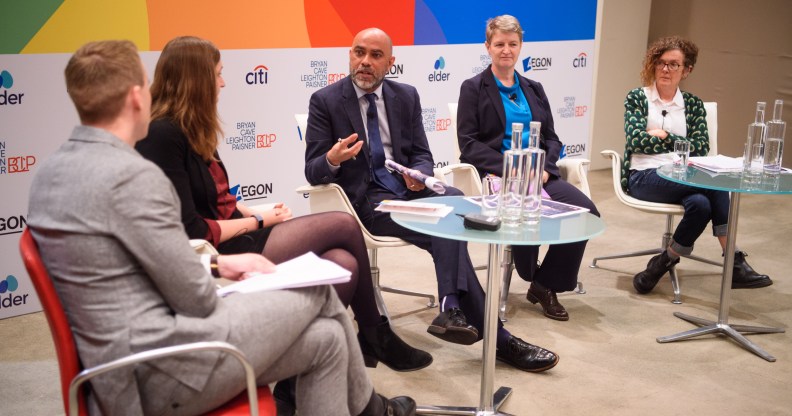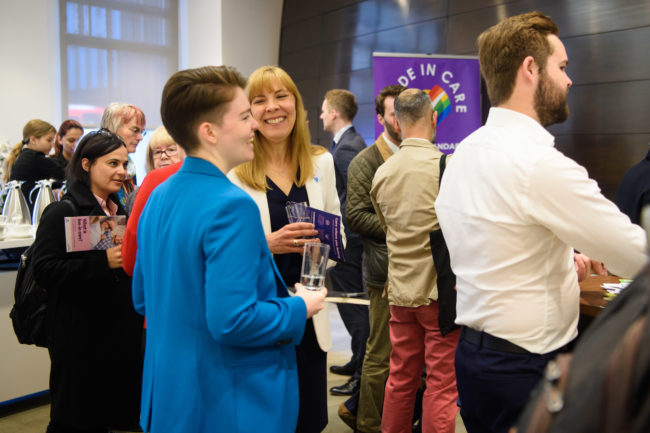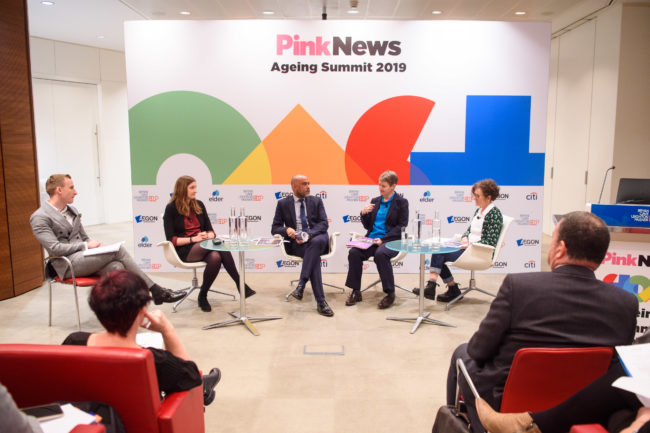Tackling loneliness and isolation can help older LGBT people’s health

L-R: Chair Paul Brand, Laura Russell of Stonewall, Michael Brady, National adviser for LGBT Health for the NHS, Alice Wallace of Opening Doors London and Helen Jones of MindOut speaking at the PinkNews Ageing Summit 2019, at Adelaide House in London. The conference focused on raising awareness of the challenges that older LGBT+ people face. (Matt Crossick/PA)
Older LGBT+ people are consistently more likely to receive less than optimum healthcare, and they have more anxiety about relying on services due to the discrimination they may be subjected to, the first-ever PinkNews Ageing Summit has heard.
A healthcare-themed panel addressed the question of why mental health is worse in the LGBT+ community and what can be done to tackle this. The depth of minority stress was said to be a major factor and a lifetime of dealing with this stress can leave older LGBT+ people vulnerable to mental health problems.
The panel, which took place at the PinkNews Ageing Summit in London on Tuesday (May 14), featured Alice Wallace, director of Opening Doors London; Laura Russell, director of campaigns, policy and research at Stonewall; Helen Jones, director of MindOut; and Michael Brady, the first-ever national LGBT+ health adviser.
Michael Brady, the government’s national LGBT+ health adviser, said that education and training is fundamental across health and social care. He is an advocate for the monitoring and capturing of information to measure the depth of inequality, and the mindful use of data and evidence to ensure that older people’s needs are met.
Brady asserted that there is real commitment on the part of the government, the Department of Health and Social Care and NHS England towards LGBT+ issues, demonstrated by government funding for community projects.

Atmosphere at the Pink News Ageing Summit 2019, at Adelaide House in London. (Matt Crossick/PA Wire)
Social isolation a problem among older LGBT+ people
Social isolation was another huge issue raised by the panel, who said some older LGBT+ people can go a week without seeing another human being. Loneliness has been found to rival smoking in its negative consequences for overall health and wellbeing.
According to Helen Jones, director of MindOut, loneliness and isolation can be tackled by providing safe spaces where people can meet, something that is particularly important as older people often feel shut out of the commercial ‘scene’ that revolves around nightlife.

Healthcare panel at PinkNews Ageing Summit. L-R: Chair Paul Brand, Laura Russell of Stonewall, Michael Brady, National adviser for LGBT Health for the NHS, Alice Wallace of Opening Doors London and Helen Jones of MindOut. (Matt Crossick/PA)
The panel agreed that we need to do more to bridge the generational gap, particularly as across the age range, people said when surveyed that they wanted more opportunities to meet one another. The generations should be brought together rather than segregated, the panel said.
Alice Wallace, director of Opening Doors London, advocated for cost-effective face-to-face training that allows healthcare trainees to interact and hear about the LGBT+ people in fellow trainees’ own family. Through this kind of in-person training, a more compassionate and person-centred approach can be ensured.
Also speaking at the PinkNews Ageing Summit was Dinesh Bhugra, the president of the British Medical Association, who, in his keynote speech, said that older LGBT+ people need more specialised healthcare to attend to their unique needs.
See PinkNews’ full Ageing Summit report below:

